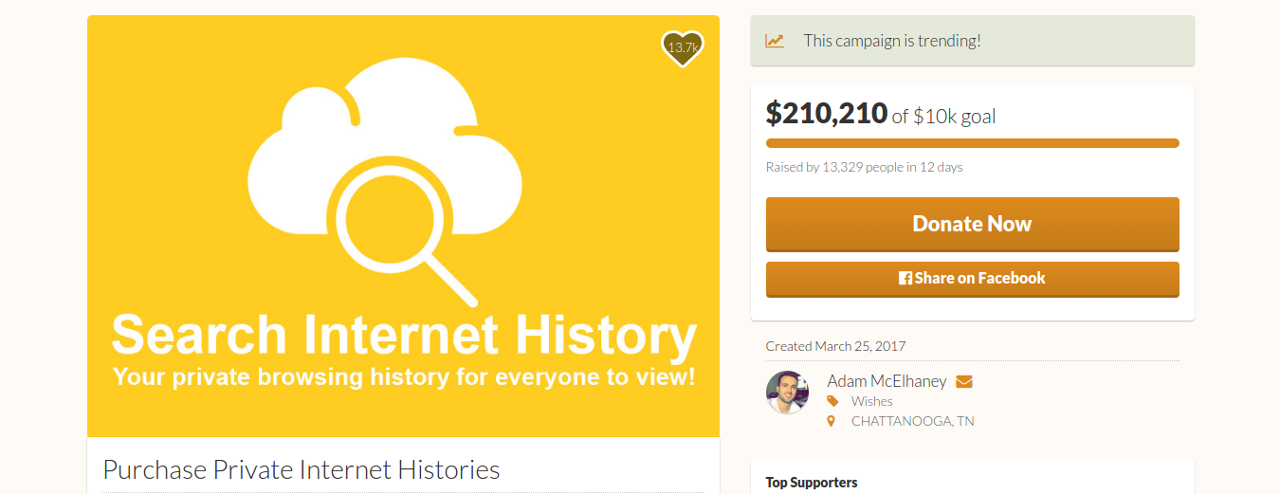American ISPs Can Sell Users' Internet History. Let's Buy Politicians Browsing History!
What is the fundraising campaign about?
The anti-privacy law S.J. Res. 34 was passed in the United States latey and was then signed by President Trump. The resolution negates the October 2016 Federal Communications Commission (FCC) rule, which enforced that internet service providers (ISPs) have to protect Americans’ personal information and internet browsing history, such as geolocation, personal medical records, financial information, and other private data. It also required internet service providers to take reasonable measures to protect consumers from hackers.
Instead of protecting their customers’ privacy, the ISPs are now allowed to sell their customers’s browsing history to the highest bidder. Adam McElhaney, a privacy activist, wants to fight the politicians with their own weapons: He plans to purchase the Internet histories of all legislators, congressmen, executives, and their families and make them easily searchable here.
He argues that “Congress has been bought and sold by big tobacco, NRA, pharmaceutical companies and telecom giants. If you want things to change, then you must fight fire with fire. We must join together and buy our own legislators. Your data will not just be bought and sold to marketing companies. If your data can be bought, anyone can buy it. Including law enforcement, insurance companies, banks, schools, ex-wives, husbands, anyone with an agenda. Let’s turn the tables. Let’s buy THEIR history and make it available.”
German politicians reacted shocked when being exposed online
His idea might actually work. A couple of months ago, internet browsing history of German politicians became public and the affected politicians reacted shocked and called for laws against online monitoring done by private companies.
In this case, journalists bought anonymized data which was collected through the browser plugin Web of Trust (WOT), but were able to reconstruct identities with the help of login names and email addresses used. The data contained all websites people visited. In one case the journalists could even access banking details and a copy of an identification card all stored in an unencrypted online storage service.
When politicians were confronted with the data, they reacted shocked. The politicians said that this kind of data could open the door for blackmail and identity theft. Some politicians called for laws against data mining if the companies cannot be trusted.
Law to restore privacy already introduced
The US activism against the anti-privacy law S.J.Res 34 is already seeing some success: Congresswoman Jacky Rosen introduced a new bill, the Restoring American Privacy Act of 2017, which will reverse the Congressional resolution signed by President Trump allowing internet providers to sell their customers’ personal information without their knowledge or consent.
Congresswoman Jacky Rosen says: “As someone who has first-hand experience as a computer programmer, I know that keeping privacy protections in place is essential for safeguarding vulnerable and sensitive data from hackers. I will not stand by and let corporations get access to the most intimate parts of people’s lives without them knowing and without consent. It is appalling that Republicans and President Trump would be in favor of taking American’s most personal information to sell it to the highest bidder. I am proud to stand up for the American people by introducing legislation to reverse this misguided resolution.”
We can win the battle for privacy
Whenever there is surveillance the data can - and will - find its way into the wrong hands. We have to stop any form of monitoring in the first place. Adam’s activism is a great step into the right direction: When we show politicians what can be done - what will be done - with their data once it is available, we have a chance that they start thinking about the consequences before passing any law lobbied for by big corporations.
When politicians realize that their actions do not only affect us, but also themselves, we have a chance that they will start fighting along with us. Then we can win this battle and take back what belongs to us: Our personal data. Because no one is allowed to accumulate our data and sell it to the highest bidder.
As for now we must hide our private data so that it can’t be monitored or abused:

